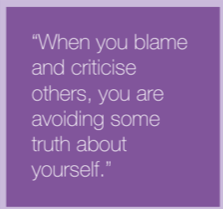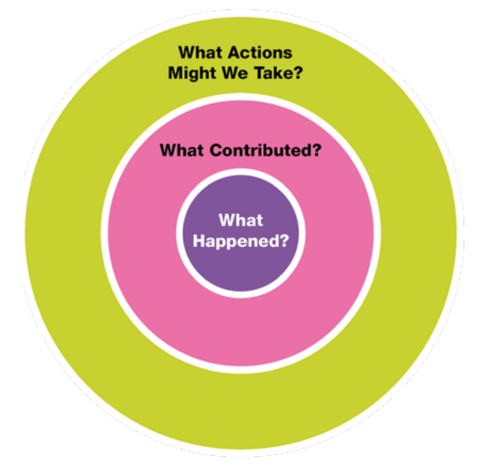How to Move On From Blame to Resolution

Every Saturday morning I try to leave home by 7:30 am, so that I arrive at the gym in plenty of time to score a car park. Experience has taught me that leaving after 7:30 significantly reduces my chances of getting a car park. On a recent Saturday, as I backed out of the garage, I glanced at the clock on my dashboard and saw that it was 7:35 a.m., meaning I would need a quick trip to the gym if I was going to get a carpark. At the end of our street, I had to wait for a scooter to go ahead of me before I could turn. With a sinking feeling about my already late state, I began to follow the scooter down the hill. “Come on,” I silently encouraged the rider. “Surely that scooter can do 50 km going downhill!!!” Apparently not and as we slowly made our way down to the traffic lights at the bottom of the hill (which we missed!) I observed myself getting angrier and more frustrated, focusing my blame for the situation in which I now found myself on the slow scooter rider.
But then I forced my angry thoughts to stop in their tracks. It wasn’t the scooter rider’s fault that I had left late for the gym. In fact, the only person to blame for this was myself. And in fact, if I was running early, instead of late, I might well have enjoyed the enforced slower pace of descent and maybe even had time to take in the stunning views of Wellington Harbour as we made our way to the lights at the bottom of the hill. I reflected on how often in life my first response is to blame an innocent party for my own short-comings.
“When you blame and criticise others, you are avoiding some truth about yourself.”
I’m guessing (well, actually, I’m blaming if I was to be really honest!) our strong human survival trait that immediately looks to self-protect by finding others to blame, rather than confronting a truth about ourselves.

It is an important lesson for both children and adults that even though our first response might be to blame others, our second response needs to be, “How have I contributed to what has happened?” and then thirdly, “What responsibility do I now need to take to rectify this situation?”
Most of my life I have been involved in the education sector, firstly as a teacher, then a senior leader and now as a facilitator, coaching leaders around change. One of the things I am noticing is the increased number of stories about unreasonable expectations being directed towards those who have committed their lives to the education of our nation’s children. The stories I am hearing are about parents blaming teachers for their child’s underperformance, unacceptable behaviour or unmet unrealistic expectations about what a teacher, who is often responsible for 25 or more students, will do for their child.
I’m not for one moment suggesting that every teacher is perfect, or that every decision a teacher makes is the best one. What I am wondering though, is how much of this ‘teacher-blame’ has its root in parents who are too busy juggling careers and/or the constant state of ‘on’ caused by digital technologies to give their children the parenting required for a successful upbringing.
Fun fact: Did you know that a child only spends 21% of their ‘awake’ time in a classroom?
“What uncomfortable truth are parents avoiding when they go into blame mode at their child’s school?”
Often in our jobs, especially if you are a leader, you have to deal with people unreasonably blaming you for things over which you have little control. What is the best thing to do in this situation? First and foremost, the worst thing you can do is to be defensive or argue back. This goes nowhere and results in everybody losing. Instead, if at all possible, listen sincerely to deeply understand the situation from their point of view and then ask clarifying
questions to help the person broaden their perspective of where the blame lies.
Another trick that is worth having up your sleeve is a strategy called a Contributions Chart. This works well when people are in problem-solving mode but will back-fire on you if you try to use it while people are angry. Draw a circle on a whiteboard or a large sheet of paper and in it, write a short description of the issue or incident. Then draw a second circle around the first and in this circle begin to write down everything that has contributed to the issue. You’ll notice that the blamefuelled contributions will come out first. Write them down and calmly ask, “And what else?” As if by magic, many more contributions will surface (Pro Tip: Let silence do the heavy lifting.) as will the
realisation that there are many things contributing to an issue. Sometimes, just getting the contributions out is enough, but if you want to take action, then draw a third circle around the second. Cross out all of the contributors that people in the room can’t control. Then in the third circle, get people to suggest actions that can be taken to deal with the contributing factors. The final step is to then agree on future actions.
I am pleased to report that I was able to eventually pass the slow scooter and was fortunate enough to get the last carpark at the gym. Lesson learnt! I promise from now on to set my alarm five minutes earlier on a Saturday!

